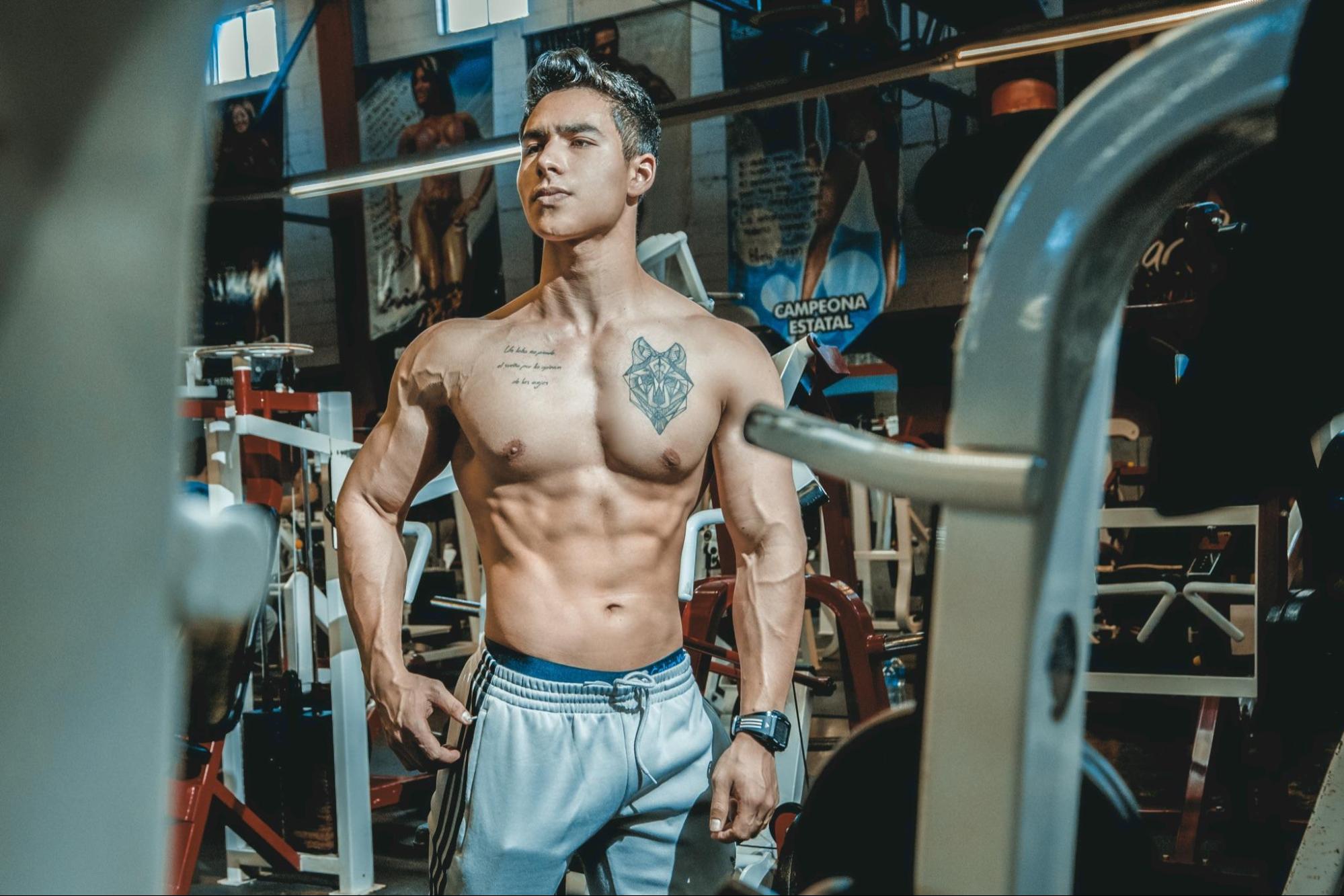Weightlifting is a great way to start if you've been searching for ways to further your fitness and health goals. Whether you're just getting started with an exercise routine or trying to take your bodybuilding efforts to the next level, adding weightlifting into your workouts will help enhance your progress. Taking it one step further in achieving those gains comes from creating a comprehensive meal plan that fuels both performance and recovery, allowing you to reach peak physical condition without crashing on empty calories. To make sure that you stay on track with all of these healthy changes, we're going to walk through how-to's for creating the perfect weightlifting meal plan explained within this blog post!
Bodybuilding Nutrition
Eating the correct number of calories is crucial for anyone looking to gain muscle mass or reduce body fat. But it's not just about counting calories; paying attention to your macronutrient consumption and eating strategy is equally important. Macronutrients, which include protein, carbohydrates, and fats, all play a critical role in fueling your body for optimal performance. And strategizing when and how often you eat can help you maintain consistent energy throughout the day. By taking the time to focus on these critical aspects, you'll be well on your way to achieving your fitness goals.
Counting Calories
The number of calories a person consumes, paired with physical activity, is vital in determining whether they will gain, lose, or maintain their current weight. Bodybuilders, for instance, need to consume an excess of calories to bulk up while simultaneously lifting weights to build muscle mass. Meanwhile, those preparing for a competition need to consume fewer calories than their body needs to lose fat while still preserving lean muscle mass. Maintaining an appropriate calorie intake is a crucial aspect of achieving fitness goals. Whether one desires to bulk up, lose weight, or maintain their current weight, their intake of calories is a vital consideration that should be considered.
Finding the right amount of calories to consume can be daunting for any bodybuilder. During the off-season or bulking phase, increasing your necessary caloric intake by 15% is crucial. Doing so will help support muscle growth and recovery. Conversely, when it's time to shed some fat, you should eat 15% fewer calories than you need to maintain weight. However, it's important to note that every person's caloric needs differ, so it's essential to consult a doctor, certified fitness instructor, or dietitian for professional guidance. If you prefer to go the DIY route, reputable online calculators can also help you calculate your caloric needs accurately. Tailoring your caloric intake based on your training phase is critical to achieving optimal results.
Related Link: Protein Pumpkin Pie Recipe
The Importance of Macronutrients
Macronutrients are a crucial energy source for our bodies, and a balanced intake is essential for someone wanting to build muscle. The three types of macros – protein, carbohydrates, and fat – are each essential for different bodily functions and contribute to the overall calorie count of our diet. There are various methods to determine the appropriate distribution of macros for an individual. Still, a general guideline for bodybuilding is consuming 55–60% of calories from carbs, 25–30% from protein, and 15–20% from fat during bulking and leaning phases. Alternatively, some recommend a distribution based on lean body mass, with a range of 2.3–3.1 grams of protein per kilogram per day, 15–30% of calories from fat, and the remaining calories from carbs. It's essential to find a balance of macros that suits your individual goals and diet and to pay attention to overall calorie intake.
Do you have any questions about our all-natural performance gummies? Contact HUMBLEROOTS today!
Foods for a Bodybuilder Diet
As a bodybuilder preparing a meal plan for the week, numerous food options exist. But what's essential is choosing foods that provide adequate calories and nutrients. Bodybuilders usually aim to feel fuller on fewer calories during the cutting phase. But in the bulking phase, it's more complex. Despite feeling full, bodybuilders may need to continue eating to meet their high-calorie intake goals. That's why focusing on foods that provide satiety and enough energy to reach those caloric goals is recommended. With a balanced and well-planned meal plan, bodybuilders can meet their physical goals while enjoying various wholesome and delicious foods.
Protein
When it comes to building muscle, protein is the king of nutrients. It is the crucial ingredient that helps repair and build muscles after an intense workout. The body needs a constant supply of protein for muscle growth and repair, making it a critical component of bodybuilding. Lean protein sources are a must in a bodybuilding diet; fortunately, there are plenty of options. Eggs, lean red meat, poultry, and fish are excellent protein sources that can easily be incorporated into a bodybuilder's meal plan. Plant-based protein sources like beans, legumes, nuts, and seeds are also great options for those following a vegetarian or vegan diet. Additionally, dairy products like yogurt and low-fat milk are excellent protein sources, but it's essential to keep an eye on the fat content. Overall, including various protein sources in a bodybuilding diet is crucial to maximizing muscle growth and achieving optimal results.
Carbohydrates
Regarding bodybuilding, carbs are an essential part of fueling your workouts. They provide the additional energy your muscles need to push through those demanding reps. But not all carbs are created equal. You want to focus on complex carbs, like whole grains, starchy vegetables, and fruits, which will give you sustained energy. Foods like oatmeal, quinoa, rice, and potatoes are excellent choices, as well as fruits like oranges, apples, and bananas. And don't forget about your veggies, as leafy greens, cucumbers, and broccoli can also provide a healthy dose of carbs. So don't be afraid to load on carbs before your next workout to power through those gains!
Fat
Regarding nutrition, it's common knowledge that protein and carbs are essential macronutrients the body needs to function correctly. However, fats often get a bad rap as the "enemy" of a healthy diet. This couldn't be further from the truth. Fats are crucial for many bodily functions, like hormone production and brain health. That said, it's essential to focus on consuming health-promoting fats, like those found in nuts and seeds, healthful oils like olive oil, and high-fat fruits like avocado. And don't worry about missing out on protein by consuming fatty foods - many foods, like nuts, provide fat and protein in one delicious package. So don't be afraid to add some healthy fats to your diet!
Related Link: Homemade Protein Bars Recipe: Easy No Bake
Meal Plan Ideas
Day 1
Start your morning off with some tasty and nutritious protein pancakes! Top them off with fresh berries for a delicious breakfast that will keep you full and satisfied until your next meal. For your mid-morning snack, keep things simple and satisfying with some apple slices and almonds. This is the perfect combination to both meet your hunger cravings and provide you with some much-needed energy. For lunch, opt for a lean ground beef burger. Pair it with lettuce, tomato, onion, and green beans for a well-rounded meal that will keep you fueled throughout the day. When you need an afternoon pick-me-up, reach for a refreshing protein shake. For dinner, whip up a tasty and nutritious shrimp stir-fry with bell pepper and brown rice. Serve it over a bed of spinach for an extra boost of iron and vitamins.
Day 2
To kick off your day, a breakfast consisting of eggs scrambled, stir-fried vegetables, and oatmeal provides a great mix of protein and fiber to energize you for the day ahead. A midday snack of a protein shake can help with muscle recovery and provide a quick energy boost. For lunch, grilled chicken breast, mixed greens, and baked sweet potato provide nutrients and are both filling and delicious. Later on in the day, a snack of a hard-boiled egg with carrot sticks can help tide you over until dinner. For dinner, broiled fish paired with green beans and brown rice make for a healthy and satisfying meal.

Day 3
Greek yogurt, almonds, whole-grain granola, and fresh berries make for a nutritious and satisfying morning meal. Snack time can be an excellent opportunity to get in some protein, and a protein shake is a convenient and tasty choice. Opt for grilled fish with a spinach salad and broccoli when it's time for lunch. Whip up an egg white omelet with bell peppers and mushrooms for another midday snack. Finally, consider grilling a chicken breast topped with fresh salsa alongside a sweet potato and a side salad for dinner.
Day 4
Starting your day with a protein shake and oatmeal is a great way to ensure you have energy and focus throughout the morning. Snack time might have you reaching for some hard-boiled eggs with some sliced peppers and cucumbers, providing protein and veggies to satisfy you. A delicious grilled chicken with cannellini bean and tomato salad combines lean protein and vegetables into one delicious meal for lunch. Come mid-afternoon, Greek yogurt with berries and nuts can help keep hunger at bay. Grilled fish with quinoa and green beans provides a healthy serving of omega-3 and fiber for dinner, making it a satisfying dinner option. With this balanced and nutritious menu, you'll fuel your body with all the nutrients it needs to take on your day.
Day 5
For breakfast, a serving of Greek yogurt with granola and berries provides a breakfast that is not only delicious but helps stabilize blood sugar and kick-start your metabolism. For a mid-morning snack, turkey breast with carrots and celery sticks provides lean protein and fiber to keep you full until lunchtime. Grilled chicken breast and spinach with sliced berries and almonds is an excellent option for lunch, as it provides a balance of complex carbohydrates, protein, and healthy fats to keep you satisfied and focused throughout the day. A protein shake makes for an easy and convenient afternoon snack and can help curb cravings for sweet or salty snacks. Finally, shrimp stir-fried with peppers, onions, and broccoli over brown rice provides a satisfying and nutritious dinner option packed with vitamins, minerals, and antioxidants. So consider these meal ideas, and prioritize healthy, nutrient-dense foods to fuel your body and mind.
Looking for performance-optimizing gummies to help you achieve your fitness goals? Learn about HUMBLEROOTS today!
Day 6
Start with a bowl of oatmeal mixed with fresh berries to provide energy throughout the morning. Add some scrambled egg whites for an additional protein boost to satisfy you until your next meal. For a mid-morning snack, try having some turkey breast with crunchy carrots and celery to hold you over until lunchtime. Enjoy a filling sirloin steak with vitamin-rich broccoli and savory mushrooms at lunch. For another snack, enjoy a crisp apple with some natural nut butter for a tasty and healthy treat. And finally, for dinner, try a broiled fish with fluffy brown rice and a mixed green salad for a balanced meal. Remember, a balanced and nutritious diet is essential for overall health and wellness.
Day 7
Start your day with a delicious breakfast that includes scrambled egg whites, cheese, peppers, and herbs for added flavor. Pair it with a slice of Ezekiel bread for a nutrient-packed start to your day. For a mid-morning boost, reach for a protein shake that will keep you full until lunchtime. For lunch, opt for a grilled chicken breast with bell peppers, black beans, and onions over a bed of crisp romaine lettuce. This delicious and satisfying dish is packed with protein and vegetables to help fuel your day. For a mid-afternoon snack, grab an apple and a handful of almonds for a sweet and nutty treat. For dinner, indulge in a delicious sirloin steak paired with sweet potato and asparagus for a hearty and nutritious meal. With these wholesome meal choices, you'll be well on your way to leading a healthier and happier lifestyle.
Planning Your Weightlifting Meals
A bodybuilding diet is essential for those looking to bulk up and exercise with weightlifting. Eating the right types of foods, in the correct amounts and with nutrient-rich ingredients will ensure that your body is getting all the sustenance it needs. While the challenge of creating an effective meal plan can be daunting, understanding certain fundamental principles can help ease the process. Ultimately, creating a meal plan tailored to your personal goals using these essential concepts will help maintain nutrition and energy levels during exercise as well as support muscle growth during recovery periods. Leveraging expert advice from fitness professionals or utilizing online resources specialized in nutrition can be helpful in customizing a meal plan that works best for your bodybuilding goals.
Related Link: 5 Natural Fat Burners: Fat-Burning Supplements




